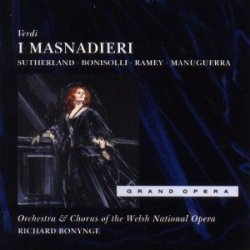Giuseppe Verdi - I Masnadieri (1993)
Giuseppe Verdi - I Masnadieri (1993)

CD1 1. Atto 1 – Preludio 2. Scena 1 Quando Io Leggo In Plutarco (Carlo) 3. O Mio Castel Paterno (Carlo) 4. Scena 2 Vecchio! (Francesco) 5. La Sua Lampada Vitale Langue (Francesco) 6. Scena 3 Vererabile O Padre (Amalia) 7. Lo Sguardo Avea (Amalia) 8. Mio Carlo (Massimiliano, Amalia) 9. Un Messagero (Francesco) 10. Sul Capo Mio Colvepole (Massimiliano) play 11. Atto 2 Scena 1 – Dall’infame Banchetto (Amalia) 12. Tu Del Mio Carlo (Amalia) 13. Perche Fuggisti Al Canto (Francesco) 14. Io T’amo Amalia (Francesco) 15. Scena 2 Tutto Quest’oggi Le Mani (Masnadieri) 16 Come Splendido E Grande (Carlo) 17 Di Ladroni Attorniato (Carlo) 18. Capitano! (Masnadieri) CD2 1. Atto 3 Scena 1 – Dio Ti Ringrazio (Amalia) 2. Scena 2 Le Rube (Masnadieri) 3. Ben Giunto O Capitano (Masnadieri) 4. Un Ignoto (Massimiliano) 5. Atto 4 Scena 1 – Tradimento (Francesco) 6. Pareami Che Sorto (Francesco) play 7. M’hai Chiamato (Moser) 8. Scena 2 Francesco Mio Figlio (Massimiliano) 9. Come Il Bacio (Massimiliano) 10. Qui Son Essi (Carlo) 11. Caduto E Il Reprobo (Calo) Massimiliano, Conte di Moor - Samuel Ramey Carlo, suo figlio maggiore - Franco Bonisolli Francesco, suo figlio minore - Matteo Manuguerra Amalia, orfana, nipote del Conte - Joan Sutherland Arminio, camerlengo della famiglia - Arthur Davies Moser, pastore - Simone Alaimo Roola, compagno di Carlo Moor - John Harris Orchestra and Chorus of the Welsh National Opera Richard Bonynge - conductor, 1982
I am always intrigued by the way some of Verdi's earlier operas have remained comparatively neglected both on stage and in the recording studio, although a little close listening and thought will sometimes provide an - if not the - answer.
"I Masnadieri" - Verdi's eleventh, "London" opera - has a lot going for it. Both the two studio recordings so far made are top quality and the opera has many armchair adherents, but the culminating absurdity of our hero stabbing his beloved to spare her the agony of losing him to the bandits (to whom he has sworn eternal fealty) is just too much to swallow. The soprano has much beautiful music written expressly for the vocal talents of Jenny Lind; consequently there is a lot of delicate coloratura and scope for the top end of the voice, but none of those gutsy plunges into the lower register that stiffen the sinews and give a little starch to a rather pale and passive heroine.
As I have said, both recordings are wonderful, if different. One might expect to hear frailties in both Sutherland's and Bergonzi's singing, she being in her mid and he in his early fifties at the times of recording (1982 and 1975 respectively), but both are superb; in fact she is more animated and has a better trill than Caballé and he is more stylish and nuanced than the stentorian Bonisolli. Both sound great, even if he is occasionally a little dry and a hint of a beat obtrudes in Sutherland's top - but these recordings represent the best of their late work. Bonisolli is certainly more exciting than Bergonzi, too; a curiosity is that he and Sutherland are allowed by Bonynge to take ringing top C's (and even a C sharp, in his case) whereas Gardelli has his singers take the rather tame lower, written options all the time. Both baritones are top class, although I prefer Manuguerra's more biting tone to Cappuccilli's woollier production; both basses are splendid: Raimondi sounds much more the starved, weakened old man but Ramey's voice is intrinsically more rotund. (Apparently credibility was strained in the first London performance, as the part of Massimiliano was taken by the celebrated and notoriously rotund bass Lablache.) Both choruses and orchestra are unimpeachable - although in the overture the Welsh National Opera's concertante cellist plays more affectingly and with more tender phrasing than his New Philharmonia counterpart. Conversely, Caballé and Bergonzi make a more moving job of their lovely duet "Ma un'iri di pace". ---Ralph Moore, amazon.com
download:
yandex 4shared mediafire solidfiles mega zalivalka filecloudio anonfiles oboom
Last Updated (Thursday, 12 June 2014 23:17)








